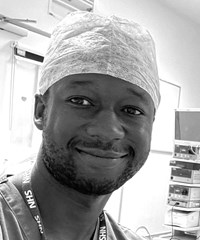ENT features
Discovery in the genetics of complex disease: Otitis media
Otitis media (OM), a common disease of childhood, is considered to be a complex trait with multiple genetic and environmental factors expected to contribute to a child’s risk of developing recurrent acute OM (rAOM; ≥3 episodes in 6 months or...
Cancer genetics and signalling pathways in ENT – a review and discussion of how this can be applied to rare tumours
Introduction Cancer cases continue to increase worldwide, and head and neck cancer is a major global health issue, with an estimated global burden of over 630,000 new cases and over 350,000 deaths per year [1]. The term ‘head and neck...
Assessment of genetic disorders: congenital sensorineural hearing loss
Severe or profound sensorineural hearing impairment (SNHI) is a common birth defect, affecting approximately 1 in 1000 newborns [1]. SNHI may result from environmental causes or have a genetic basis. The genetic causes can be further subdivided into non-syndromic (isolated...
Hidden genetic disorders in children that may present to the otolaryngologist
Background Among the many hundreds of children presenting to the otolaryngology clinic are a few whose symptoms are due to an underlying genetic condition. In most cases the underlying syndrome is obvious and has already been diagnosed, such as the...
Leadership in academia
I went into medicine with the clichéd view of wanting to help people. I found that by doing surgery I could help a small number of people, albeit usually to a large effect. Then, I recognised that by engaging in...
Clinical leadership and management: the ‘Darzi’ experience
The Fellowship in Clinical Leadership programme, more commonly known as the ‘Darzi Fellowship,’ commenced in 2009. It was designed to provide junior doctors at the registrar level with postgraduate training in clinical leadership and change management in order to develop...
Time to professionalise medical leadership
For a profession proud of its adherence to an evidence base, medicine has been remarkably slow to acknowledge and to act on the evidence which underpins the value of good leadership to patients and the healthcare system. Mr Robert Francis...
Clinical leadership and management: developing world ENT
I have been asked to share some of the initiatives I have been involved with to address ENT-related challenges in Africa and the developing world. Developing countries constitute the majority of the world’s landmass (Figure 1), are home to >50%...
ENT leadership
Challenges The first challenge is to agree what we mean by the term leadership because there are many different ways in which the term is used. What is, however, a consensus is that the key distinction between leadership and management...
Clinical management: a personal view
When Nigel Beasley approached me to write on my experience of clinical management, I was a little surprised. I see myself as primarily a clinician, but have had increasing involvement with clinical management within my Trust. I am now in...
Thoughts on war: von Clausewitz revisited
We few, we happy few, we band of brothers; For he to-day that sheds his blood with me Shall be my brother; be he ne’er so vile, This day shall gentle his condition: And gentlemen in England now a-bed Shall...
In search of courage; transition into Army
In search of courage. Well, that is how it all started. I was fairly advanced in surgical training not to mention age, when I decided to join the Territorial Army (TA). My peers, on hearing this couldn’t decide whether I...




















